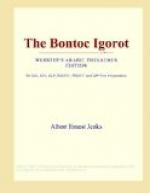One is surprised to find that sores from bruises do not generally heal quickly.
The Igorot attempts no therapeutic remedies for fevers, cholera, beri-beri, rheumatism, consumption, diarrhea, syphilis, goiter, colds, or sore eyes.
Some effort, therapeutic in its intent, is made to assist nature in overcoming a few of the simplest ailments of the body.
For a cut, called “na-fa’-kag,” the fruit of a grass-like herb named la-lay’-ya is pounded to a paste, and then bound on the wound.
Burns, ma-la-fub-chong’, are covered over with a piece of bark from a tree called ta-kum’-fao.
Kay-yub’, a vegetable root, is rubbed over the forehead in cases of headache.
Boils, fu-yu-i’, and swellings, nay-am-an’ or kin-may-yon’, are treated with a poultice of a pounded herb called ok-ok-ong’-an.
Millet burned to a charcoal, pulverized, and mixed with pig fat is used as a salve for the itch.
An herb called a-kum’ is pounded and used as a poultice on ulcers and sores.
For toothache salt is mixed with a pounded herb named ot-o’-tek and the mass put in or around the aching tooth.
Leaves of the tree kay’-yam are steeped, and the decoction employed as a bath for persons with smallpox.
Death and burial
It must be said that the Bontoc Igorot does not take death very sorrowfully, and he does not take it at all passionately. A mother weeps a day for a dead child or her husband, but death is said not to bring tears from any man. Death causes no long or loud lamentation, no tearing of the hair or cutting the body; it effects no somber colors to deaden the emotions; no earth or ashes for the body — all widespread mourning customs among primitive peoples. However, when a child or mature man or woman dies the women assemble and sing and wail a melancholy dirge, and they ask the departed why he went so early. But for the aged there are neither tears nor wailings — there is only grim philosophy. “You were old,” they say, “and old people die. You are dead, and now we shall place you in the earth. We too are old, and soon we shall follow you.”
All people die at the instance of an anito. There have been, however, three suicides in Bontoc. Many years ago an old man and woman hung themselves in their dwellings because they were old and infirm, and a man from Bitwagan hung himself in the Spanish jail at Bontoc a few years ago.
The spirit of the person who dies a so-called natural death is called away by an anito. The anito of those who die in battle receive the special name “pin-teng’”; such spirits are not called away, but the person’s slayer is told by some pin-teng’, “You must take a head.” So it may be said that no death occurs among the Igorot (except the rare death by suicide) which is not due directly to an anito.
Since they are warriors, the men who die in battle are the most favored, but if not killed in battle all Igorot prefer to die in their houses. Should they die elsewhere, they are at once taken home.




